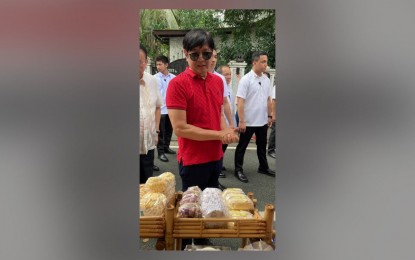
BREAD FOR PATRIOTS. President Ferdinand R. Marcos Jr. talks with bakers from Cuenca, Batangas, who showcased their bread products fortified with readily available crops during a trade show at the Malacañang grounds in Manila on Saturday (Dec. 2, 2023). The local bakery industry seeks more government support for their food self-sufficiency initiative. (Photo courtesy of Tinapayan Festival)
CUENCA, Batangas – Bakers from this town are showcasing products partly made from indigenous crops to drum up support for their food self-sufficiency campaign and as a strategy to thwart an onslaught of foreign competitors.
In an interview on Tuesday, Lucito Chavez, president of the Asosasyon ng Panderong Pilipino (APP), said his group has successfully developed products made from coconut, squash and sweet potato flour which, if accepted by domestic consumers, can substantially lower the country’s dependence on imported flour or locally milled flour made from imported wheat.
He noted that aggressive research and development efforts by some APP members have yielded “pandesal” (Filipino salted bread) fortified with malunggay leaves (Moringa oleifera) and carrots, increasing their nutritional value while decreasing sugar content.
“We were able to present our products to the President (Ferdinand R. Marcos, Jr.) last Saturday in Malacañang [during the Office of the President’s Family Day]. He liked the idea of local crops being used in bread-making. Hopefully, the government will get behind our initiative. That way, local bakers can survive and local farmers can survive as well,” Chavez said in Filipino.
He lamented that while multinational baking corporations have successfully established themselves in the Philippine market, they are forcing community bakeries out of business.
He explained that a widespread acceptance of bread made of locally grown raw materials will strengthen Filipino bakers’ position against the well-funded foreign competition.
The APP represents small and medium-sized community-based bakeries, that are distinguished from large industrial bakeries that often distribute their products via supermarkets.
Meanwhile, Jesus Arranza, chair of the Federation of Philippine Industries and lead convenor of the Buy Pinoy, Buy Local Movement, said there is a surge of imported food products that are coming into direct competition with established local manufacturers.
He said these imported products, which include junk food, have no apparent value added compared to local goods but are now threatening established Philippine businesses and the jobs of their employees.
Arranza urged the Department of Trade and Industry to impose safeguard duties on foreign food products, noting that "they are empowered to do so when it is learned that there is an import surge, and this influx of foreign goods threatens local industries."
"We should learn to protect our own,” he told the Philippine News Agency.
Arranza explained that a safeguard duty is a tariff imposed on top of existing duties, and is applied to save domestic companies against unfair competition from overseas.
The FPI is touted as the voice of the Philippine manufacturing sector, whose membership includes food and beverage, automotive, textiles, steel, construction materials, and energy companies, among others. (PNA)
